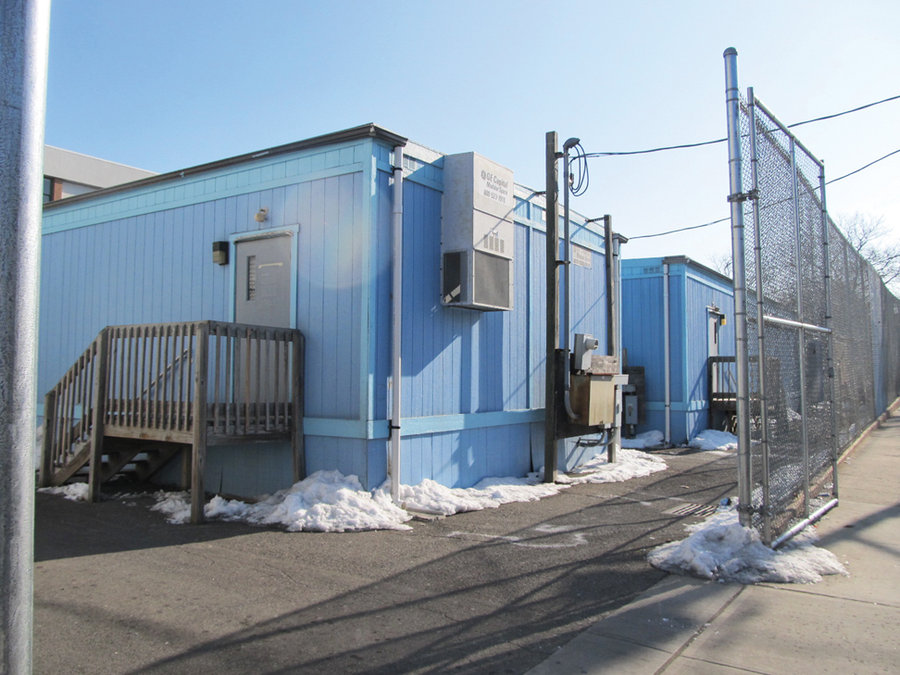With trailers housing classrooms at nearly every school in the district, the Jersey City Board of Education is reviewing its options for replacing or doing away with those that are in the worst shape.
The district has 52 trailers, and 49 are used for classrooms. The district has evaluated its fleet, looking at their age and condition to determine how cost effective it will be to replace them.
During the Feb. 18 board meeting, District Business Administrator Luiggi Campana said estimates to repair or replace trailers across the entire district range from about $400,000 to $3.6 million.
The condition of the trailers varies, Campana said, with some of the older more robust trailers in better condition than newer ones. The draft document on the trailer evaluation is over 500 pages, he said.
Campana said the district has asked for an evaluation from an architectural firm to develop guidelines and recommendations for what to do next.
“At the high end it would cost us about $3.6 million to repair or replace, and about $400,000 if we do the minimum,” he said.
He said most of the trailers are in the 20-year age bracket. The oldest is 37 years old, the newest are about 14 years old.
“Not many school districts have trailers as old as the ones we have. Our architect is amazed that these have lasted as long as they have.”
The normal life span of a trailer is from 12 to 15 years, and more than half of those in Jersey City are beyond their useful life span.
“We don’t know all the history for decision making for how we brought on trailers,” he said. “But it was partly to accommodate pre-K. There was originally a commitment to build centers for these classes, but this didn’t happened. So trailers were placed in schools where population growth was taking place.”
Trying to involve the state
“Part of the discussion is, how do we take the information that is given to us and address the trailer situation,” Campana said. “We’re trying to get a dialogue with the SDA (NJ Schools Development Authority) since this was an SDA initiative that was never realized.”
He said the district has brought some classes back into main buildings from the trailers, and is currently looking for room in some of the schools to do more of this.
“We do it where it makes sense,” he said.
Some of the existing trailers also house kindergarten classes. Trailers in most cases have the same technology as the schools to which they are attached, such as being wi-fi enabled.
Schools Superintendent Dr. Marcia Lyles said the long range facilities plan should allow the district to determine what schools have space inside their buildings that might allow classes to move out of trailers.
The average pre-k class is about 15 students per trailer.
“When the Heights school is complete, it will have space for 150 pre-k students that should help reduce pressure on other schools,” she said.
But the trailer maintenance situation needs to be addressed and Campana said he would like to have a program in place by the summer.
“We do not want to have a disruption,” he said, noting that the replacement or upgrade of trailers will depend on available recourses.
“We’re looking at the budget as to what kind of resources we will have for this project,” he said.
“No matter what happens, the district has kept up with maintaining them beyond the life span,” he said. “We’re still responding to the needs.”
He said the district is looking for guidance from the SDA on how to manage what the district has. This will cover how to take certain trailers out of service and use the ones that are still in good enough shape
“We take trailers to [repair facilities at] Caven Point and do work on them,” he said, “so we have them ready in case we have to take other trailers out.”
Some modular trailers are in the best condition, even though some of these are also older trailers, he said.
“We’re looking for a company that supplies modular trailers so that we might save money on the initial cost for replacements,” he said.
Trailers are not permanently attached to any school, Campana said. Most schools use them for a five years span. Yet at some schools they have become more or less permanent.
“We will have to set up some kind of replacement schedule,” he said.
Board trustee Gerald Lyons said replacement should not be based on age, but on the condition of the trailer. He suggested that repair of the trailers might be incorporated into some of the shop classes.
Al Sullivan may be reached at asullivan@hudsonreporter.com.
